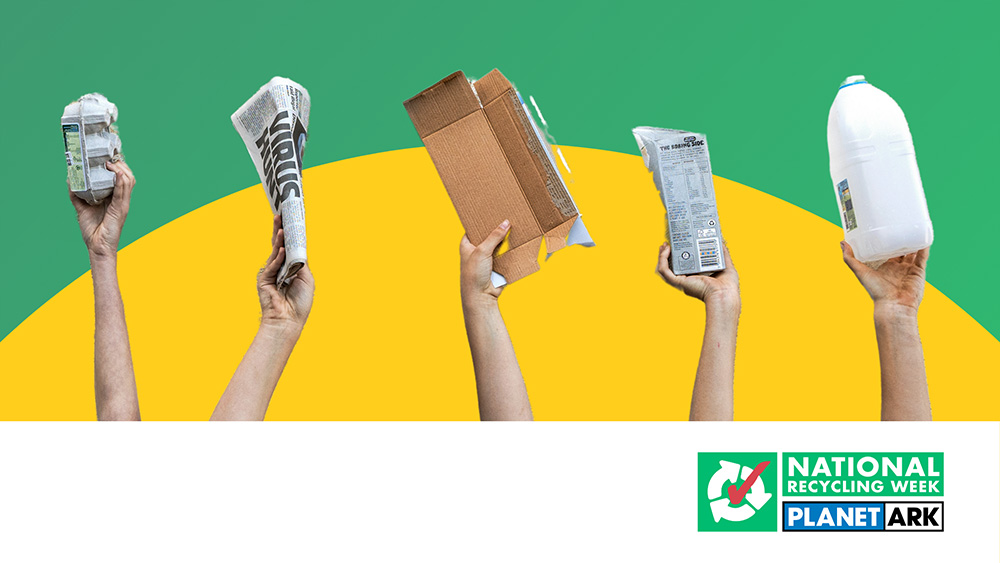Subscribe to The Stand
Want more UOW feature stories delivered to your inbox?
It's National Recycling Week and we asked UOW's Dominique Di Leva to set the record straight.
November 11, 2024
National Recycling Week (11–17 November) aims to improve recycling knowledge and promote better practices. We asked UOW's Dominique Di Leva to set the record straight on some of the most persistent recycling misconceptions.
Ever wondered if that greasy pizza box can actually be recycled?
(11–17 November) is here, and this year’s campaign theme, ‘Join the Cycle’, urges councils, workplaces, schools, and individuals to improve recycling knowledge and build better practices.
To this end, now’s the perfect time to debunk some common recycling myths to reduce our environmental footprint.
And who better to lend their expertise than Dominique Di Leva, Operations Manager – Cleaning and Waste from UOW’s Infrastructure and Property Division.
Is there a rule about rinsing before recycling? Perplexed about the latest paper towel policies? It’s time to set the record straight on some of the most persistent recycling misconceptions.
“Coffee cups cause a lot of confusion among the community. There are some brands that can be recycled; however, most coffee cups contain plastic mixed within the paper, making them non-recyclable,” Dominique says.
“I like to go by the rule: ‘lids in the recycling, cups in the general waste’. But why not bring your own cup? Some cafes will even reward you with a small discount.”
“The use of these symbols is not monitored and can mean different things, like what material the product is made from. These symbols should not be relied on to determine if an item is recyclable,” Dominique advises.
“I recommend only using the , which can be found on a growing range of items sold by supermarkets.”
“Yes, pizza boxes with some oil and grease can go into your recycling bin. However, old pizza cannot be recycled, so please ensure your crusts and leftovers are removed and saved for leftovers or placed into your food waste (FOGO) bin.”
“There are mechanisms in place to remove incorrect items (often referred to as contamination). If a truckload is above a threshold for contamination, it may be rejected by the recycling plant and will then end up in landfill.”
But hazardous waste is a different story. “Did you know there is about one truck fire every day in Australian garbage and recycling trucks? Most of these are caused by batteries, which should never go into any bin.” Dominique advises taking batteries to in your local area.
“Correct. Changes to the NSW EPA legislation mean that paper towels, along with cardboard, compostable packaging, tea bags, tissues, animal droppings, and coffee filters, must now be placed into the red bin,” Dominique says. “One option to avoid paper towel waste would be to use electric hand dryers where available.”
“Items do not need to be rinsed. However, they need to be empty of food.” In other words, there’s no need to rinse a container like an empty milk bottle before putting it in the recycling bin – just ensure items are dry and don’t contain any food.

“Unfortunately, recycling is not black and white. If a plastic lid is on a plastic bottle, this should be fine to go into the recycling still attached. However, if you have a metal lid on a glass bottle or jar, this will need to be removed as the materials are not compatible in the recycling process,” Dominique says.
“The good news is that the NSW EPA has proposed changes which will require plastic lids to be tethered to plastic bottles – this will reduce litter and improve recycling rates.”
“Just because something is recyclable, it does not mean it can automatically go into your kerbside recycling bin. Soft plastics can be recycled, but only when taken to specialised recycling drop-off points,” Dominique says.
UOW has implemented a specialised program to recycle soft plastics. “There are drop-off points at select locations which mean that specific soft plastics, especially from deliveries, can be diverted from landfill.” Dominique also advises that the Illawarra and Shoalhaven Joint Organisation has organised a public soft plastics drop-off event this year, just after Christmas. near you.
“Australia is focusing more on domestic recycling as a sustainable alternative to shipping waste overseas, especially since international markets have become more restrictive, with China, for example, banning imports of foreign recyclables in 2018,” Dominique says. “This shift has led to increased investment in local recycling infrastructure, technology, and policy reforms.”
Dominique shares that key technologies on the horizon include advanced chemical recycling for plastics, automation and AI sorting, and waste-to-energy plants. “These plants convert non-recyclable waste into energy, helping reduce landfill waste,” she says. “Although controversial, waste-to-energy can complement recycling efforts when done with strict environmental controls.”